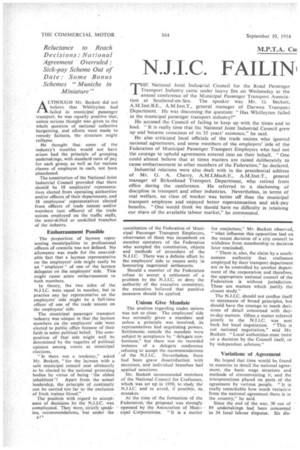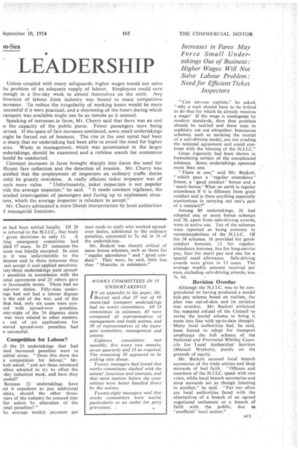N.J I.C. FALUN
Page 46

Page 47

If you've noticed an error in this article please click here to report it so we can fix it.
LEADERSHIP
THE National Joint Industrial Council for the Road Passenger Transport Industry came under heavy fire on Wednesday at the annual conference of the Municipal Passenger Transport Association at Southend-on-Sea. The speaker was Mr. G. Beckett, A.M.Inst.B.E., A.M.Inst.T., general manager of Darwen Transport Department. He was discussing the question: "Has Whitleyism failed in the municipal passenger transport industry?"
He accused the Council of failing to keep up with the times and to lead. " It is really time that the National Joint Industrial Council grew up and became conscious of its 35 years' existence," he said.
He also criticized local officials of the trade unions who ignored national agreements, and some members of the employers' side of the Federation of Municipal Passenger Transport Employers who had not the courage to uphold agreements entered into on their behalf. "One could almost believe that at times matters are raised deliberately to cause embarrassment to other members of the Federation," he declared.
Industrial relations were also dealt with in the presidential address of Mr. G. A. Cherry, A.M.I.Meeh.E., A.M.Inst.T., general manager of Birkenhead Transport Department, who retired from office during the conference. He referred to a slackening of discipline in transport and other industries. Nevertheless, in terms of real welfare, no class of worker was better off than the municipal transport employee and enjoyed. better superannuation and sick-pay benefits. "One would think we should have no difficulty in retaining our share of the available labour market," he commented. Unless coupled with many safeguards, higher wages would not solve be problem of an adequate supply of labour. Employees could earn nough in a five-day week to absent themselves on the sixth. Any Eversion of labour from industry was bound to exact competitive ncreases. To reduce the irregularity of working hours would be more uccessful if it were practical, and a shortening of the hours during which ransport was available might not be as remote as it seemed.
Speaking of increases in fares, Mr. Cherry said that there was an end o the capacity of the public purse. Fewer passengers were being arried. If the spate of fare increases continued, some small undertakings night be forced out of business. The rise in the cost spiral had been o sharp that no undertaking had been able to avoid the need for higher ares. Waste in management, which was accentuated in the larger indertakings, should be examined and a ruthless search for economies hould be conducted.
Constant increases in fares brought sharply into focus the need for fficient fare collection and the detection of evasion. Mr. Cherry was atisfied that the employment of inspectors on ordinary traffic duties ould be greatly overdone. A really efficient ticket inspector was of -inch more value. "Unfortunately, ticket inspection is not popular vith the average inspector," he said. "It needs constant vigilance, the fetailed interrogation of passengers and facing up to unpleasant situaions, which the average inspector is reluctant to accept."
Mr. Cherry advocated a more liberal interpretation by local authorities .f managerial functions.




















































































